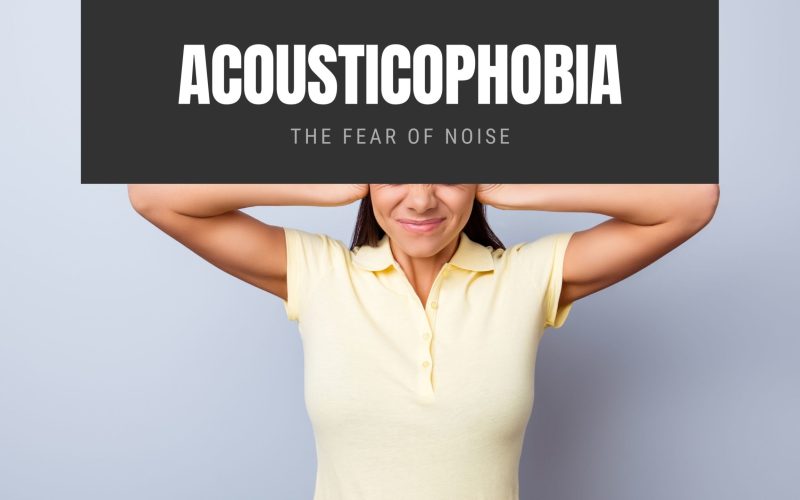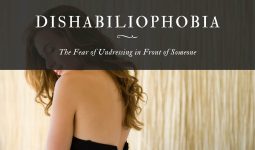Acousticophobia can be termed as the irrational fear of noise. A person suffering from this condition can experience severe anxiety just by thinking of noise, let alone experiencing it.
Essentially, people with a fear of noise may experience intense anxiety that may even result in a full-blown panic attack.
Although such a surge of anxiety might not always be the case for individuals with acousticophobia, it is still very possible to manifest nonetheless.
Among several other signs, anyone having a full-blown panic attack due to acousticophobia may expect to have an elevated heart rate, higher blood pressure, an increased breathing rate, muscle tension, excessive sweating, and shaking.
While panic attacks may not always be the norm for anyone with acousticophobia symptoms, they may still occur, particularly if their symptoms are very extreme.
Someone with acousticophobia may find themselves avoiding what might trigger them. Extreme measures can be taken to ensure they are not exposed to noise.
People with this disorder, for instance, could refuse to step out of their house for fear that they might likely hear some noises that may trigger them. One of the major causes of their mental anguish is likely to be undue concern and irrational thought.
It is also possible for someone with the condition to avoid what might trigger them to minimize or prevent their chances of dealing with anxiety. In most cases, doing so may aggravate the symptoms caused by the fear of noise.
Symptoms of Acousticophobia
As with almost any other phobia that occurs, individuals with acousticophobia would expect their disorder’s most prominent symptom to be anxiety.
As previously stated, their fear can also be so intense that they can also suffer full-blown panic attacks as a result of it.
They might also have to be hospitalized, depending on the extent of their panic attack. However, this will vary from person to person and will be based on several factors.
Also, someone with acousticophobia can undertake painstaking efforts to ensure they don’t have to face their fear.
This may suggest that they avoid places where they may come into contact with their anxiety and that by taking a more hands-on approach, they can consciously try to prevent it from occurring.
You can see some more common acousticophobia symptoms below:
- Anxiety
- Avoiding any form of noise
- Difficulty dealing with noise
- Sweating, muscle tension, and shakiness
- Panic attacks
Causes of Acousticophobia
There are no definitive causes of acousticophobia. Nevertheless, genetics and one’s environment may play significant roles in developing this condition.
For example, if someone has a family history of mental illness, especially anxiety disorders or specific phobias, they may have a higher chance of developing acousticophobia.
This may be due to them having a genetic predisposition to developing mental illness in general.
If anyone were to have these genetic complications, then for them to develop full-blown acousticophobia, they might experience some traumatic incident.
Any emotionally traumatic event that includes different fears linked with acousticophobia might trigger the fear of noise in anyone, as long as they have the right genetics.
Although the precise causes of acousticophobia are not clear, the opinion among most specialists in mental health is that both biology and environmental factors play a very important role in developing any given mental illness.
Therefore, a closer look at these two distinct parameters may shed some light on whether you may be at risk of being acousticophobic.
Treatments
There are no precise causes of acousticophobia, so there are still no explicitly formulated treatments for this disorder. However, several types of care are still available, which may greatly relieve many of its symptoms.
Cognitive-behavioral therapy (CBT), exposure therapy, and some psychiatric drugs, among others, are some of these treatments.
Yoga Poses
Several yoga poses can greatly help anyone who has acousticophobia. This is partly due to the meditative state of mind that yoga releases when practiced daily.
You can term yoga as meditation in motion because your mind can be channeled to something more positive. It can also be used to alleviate some of the anxiety associated with acousticophobia.
Many forms of yoga, including hatha or hot yoga, can help anyone with acousticophobia. Nevertheless, nearly all of them can help alleviate some of the tension and anxiety linked with acousticophobia, regardless of the different types of yoga.
If you have never incorporated yoga into your daily routine before, it may be best to take a class or watch videos to help you master each pose. Like meditation, the more you practice, the more adept you will become at yoga.
Besides helping you minimize your acousticophobia symptoms, many people with a fear of noise can also experience increased flexibility and strength, among other benefits.
Mindfulness-Based Stress Reduction (MBSR)
MBSR is a 2-month evidence-based curriculum that includes secular, comprehensive instruction in mindfulness to assist people with depression, anxiety, stress, depression, and other kinds of mental distress.
As mindfulness meditation is very effective for anxious people, MBSR may benefit someone who is suffering from acousticophobia sufficiently.
Someone with acousticophobia should expect to acquire various skills in such a systematic approach that can enable them to alleviate anxiety issues associated with their particular phobia.
Consult with a doctor or therapist to see how you can find out if MBSR can help minimize the severity of your acousticophobia symptoms and where you can find MBSR services in your area.
Meditation
Several meditation techniques can be very useful for anyone suffering from acousticophobia. Mindfulness meditation has been shown to help individuals reach a more happy and positive state.
There are different ways to practice mindfulness meditation, and many meditation apps are designed to make it as simple as possible.
Mindfulness has the power to benefit those who have acousticophobia greatly because how it can distract from their anxiety by refocusing their attention on something that does not have any emotional issues attached to it.
Individuals may be asked to concentrate on their breath, for instance. Concentrating on one’s breath is one of the most fundamental ways to meditate and be aware.
It may help people with acousticophobia who experience panic attacks to redirect their attention to other sensations.
This may potentially help minimize the amount of mental distress encountered during such an influx of anxiety by redirecting one’s mind to the different stimuli felt when breathing.
To implement mindfulness meditation to help relieve acousticophobia symptoms, people with a fear of noise can control the contraction in their abdominal and chest muscles.
They can achieve this by controlling their breathing with each inhale and exhale.
You can also concentrate on the sounds around you, how your skin feels when you touch certain things, the taste of foods, and how some aromas smell, in addition to concentrating on your breathing.
Essentially, honing your five senses will greatly enable you to reduce some of the anxiety associated with acousticophobia.
Also, note that being an adept meditator will take considerable practice.
Exposure Therapy
Exposure therapy is one of the most effective approaches to treating anxiety disorders such as acousticophobia.
It can be an effective way of helping the patient desensitize to their fears. Nonetheless, only qualified therapists must be allowed to incorporate this treatment method.
For instance, if the therapist were to introduce someone with acousticophobia to their fear partially, it would not be very successful because they would require a larger amount of exposure to induce any beneficial patient shift.
If the therapist were to expose someone with acousticophobia to their fear excessively, doing so might be counterproductive. This may even worsen the condition if care isn’t taken.
It is also important that for someone with acousticophobia, the therapist initiating exposure therapy has a very good understanding of how serious their symptoms are. This is so they can recognize the amount of exposure the patient is likely to handle.
Cognitive Behavioral Therapy (CBT)
A psycho-social approach aimed at improving one’s mental health is CBT. It is a tool that is commonly used to treat individuals with anxiety disorders such as GAD and OCD.
People with acousticophobia could also benefit from CBT while also seeing how it will allow them to have a much clearer understanding of why they think and behave about their irrational fears the way they do.
Considering the tremendous automaticity of their symptoms, CBT can be incredibly beneficial for those fearing noise. For instance, they will mostly have an instant, spontaneous reaction to their object of fear.
Such a lack of introspection may be a significant part of why anyone with this disorder will struggle to their degree. Cognitive-behavioral therapy can help you pause for a moment and examine what worries you more thoroughly than usual.
Psychiatric Medications
- Anti-anxiety meds
To help avoid panic attacks, these varieties of drugs are very useful. Because people with phobias very frequently experience panic attacks, such medications can be particularly helpful for individuals who have serious acousticophobia. Klonopin, Xanax, and Valium, among many others, are some popular anti-anxiety drugs.
Usually, these medications are not administered regularly, but maybe, depending on how severe their acousticophobia is. Nevertheless, before you decide to do so, this is something that you should first address with your doctor to ensure that it is safe and reliable.
- Antidepressants
These drugs are not only for people suffering from depression, but they can also benefit people with anxiety disorders, such as acousticophobia. Zoloft, Paxil, and Lexapro, amongst many others, are some popular antidepressants. Any of the drugs may be used to control many of the symptoms of acousticophobia.
These types of medications are usually taken regularly. They can also help avoid panic attacks, but they are most commonly used to help reduce people’s everyday anxiety. Speak to your doctor to see if you can help reduce your symptoms of acousticophobia by taking antidepressants, as well as whether or not this is safe.
Exercise
For people who suffer from anxiety disorders, including acousticophobia, exercise is highly helpful. Cardiovascular exercise, in particular, can greatly help alleviate stress.
This is not to suggest that training for weight resistance does not help anyone with anxiety. Rather, aerobic routines are more efficient in releasing certain chemicals, such as endorphins.
According to the American Psychology Association, physical activity can help to condition the mind to better cope with stressful conditions. This makes a lot of sense when we consider the high amount of stress the body is under during strenuous exercise.
So, if you are sedentary yourself, participating in some aerobic exercise will substantially reduce your acousticophobia symptoms by making it much easier for you to deal with the anxiety and stress associated with the condition.
We have different aerobic routines that we can engage in to help minimize the symptoms of acousticophobia.
These routines may include bike riding, swimming, skiing, jogging, and walking. You can also take advantage of exercise by playing sports such as basketball, tennis, soccer, racquetball, and basketball.
Consistently participating in some form of exercise can help alleviate some of the pain linked with acousticophobia over time.
Reducing Caffeine Intake
It is no news that consuming large quantities of caffeine will help make you more nervous during the day.
This makes sense as we look closely at how caffeine controls the physiology of our body.
When we ingest a high amount of caffeine, our heart starts to beat more rapidly. “Essentially, this pushes our body into a “fight or flight” mentality.
For anyone with acousticophobia to experience panic attacks, such a state of mind is also a precursor.
Therefore, consuming little to no caffeine during the day will substantially help decrease your daily anxiety.
While doing so would certainly not make all of your distress go away, if you were to drink a significant amount of caffeine, it would also allow you to minimize any needless pain you would have endured otherwise.
Certain energy drinks, including coffee and tea, are also high in caffeine. Some foods, including dark chocolate, also contain caffeine.
Being more mindful of your everyday caffeine intake will enable you to reduce some of the acousticophobia-related symptoms.
Dialectical Behavior Therapy (DBT)
For individuals dealing with emotion control, DBT has proven to be a very successful method of care. It is also used to treat people with borderline personality disorder. For people suffering from anxiety disorders like acousticophobia, it may also be very advantageous.
This is due to the many coping abilities that you would expect to acquire in a DBT community. Usually, these groups last around six months and may have anywhere from two individuals to many individuals, depending on how many people participate.
Half-smiling is a really useful DBT skill for supporting those with acousticophobia. This method works by making you think about what you fear or disturb you by smiling softly and slightly raising the corners of your mouth, hence the word “half-smiling.”
But it is not enough to think about your fear of noise while half-smiling; you also have to try to avoid entertaining certain painful emotions that might evoke your particular fear.
Mindfulness meditation is also commonly used in DBT. When performed in a group setting, it can greatly support individuals who are acousticophobic, helping them to step out of their comfort zone.
Another very useful DBT attribute that can assist those with acousticophobia is coping ahead. You would want to find a place to settle down peacefully without distraction by coping ahead.
Close your eyes, and then think of the many different potential situations you can face and resolve or cope with your particular fear.
If you are exposed to the particular fear associated with it in real life, doing so will allow you to be much more adept at dealing with your fear of noise.





